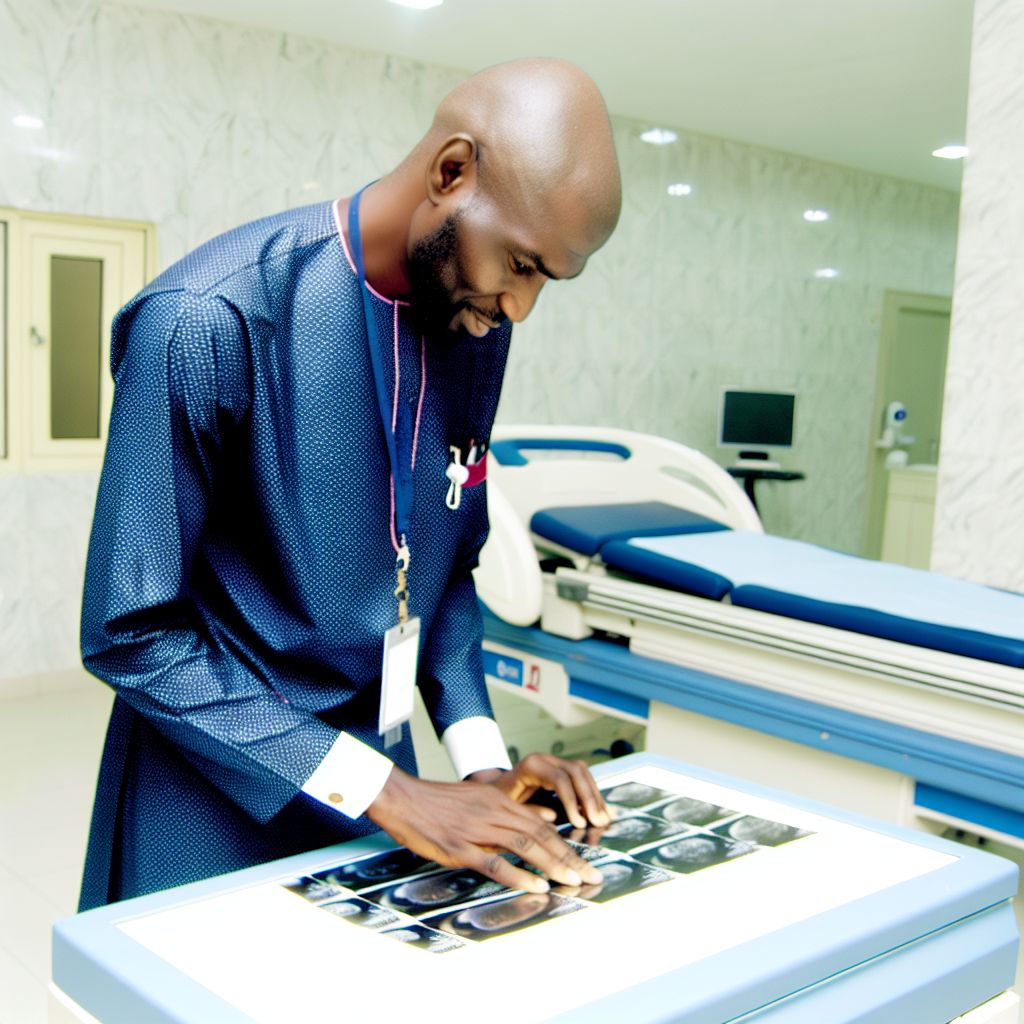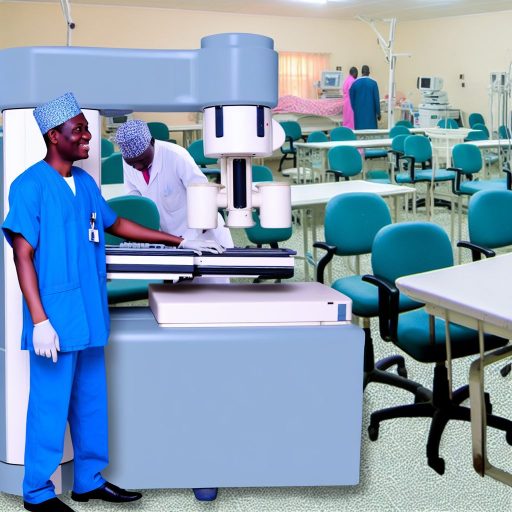Introduction:
A radiographer in Nigeria plays a crucial role in the healthcare sector by using medical imaging techniques to assist in diagnosis and treatment.
Overview of Radiography in Nigeria:
Radiography in Nigeria has evolved significantly over the years, with advancements in technology and training programs for radiographers.
Importance of Radiographers in the Healthcare Sector:
Radiographers are essential members of the healthcare team, as they help in the early detection and diagnosis of various medical conditions.
They also play a critical role in guiding healthcare providers in making informed decisions regarding patient care and treatment options.
By using X-rays, CT scans, MRIs, and other imaging techniques, radiographers contribute to improved patient outcomes and overall healthcare quality.
Their precise imaging skills and attention to detail are vital in detecting abnormalities and providing accurate results to healthcare professionals.
Overall, radiographers enhance the efficiency and effectiveness of healthcare services, making them indispensable in the healthcare system of Nigeria.
Educational Requirements for Radiographers in Nigeria:
In Nigeria, to become a Radiographer, individuals must meet specific educational requirements.
Pursuing a Bachelor’s degree in Radiography is the primary step towards this career path.
This rigorous program equips students with the necessary knowledge and skills to excel in the field of radiography.
Furthermore, after completing their degree, aspiring Radiographers must undergo licensing and certification exams.
These exams are crucial as they ensure that professionals meet the standards set by regulatory bodies in the country.
Passing these exams demonstrates competence in the field and is a prerequisite for practicing as a Radiographer in Nigeria.
Moreover, continuing education is vital for Radiographers to stay updated with the latest advancements in the field.
As technology in radiography continues to evolve, professionals must engage in ongoing education to enhance their skills and knowledge.
This also helps them provide quality healthcare services to patients and improve their career prospects.
Overall, meeting these educational requirements is essential for Radiographers in Nigeria to kickstart their careers and stay competitive in the dynamic healthcare industry.
By obtaining a Bachelor’s degree, passing licensing exams, and engaging in continuous education, these professionals can ensure their success and contribute to the healthcare system effectively.
- Bachelor’s degree in Radiography
- Licensing and certification exams
- Continuing education requirements
Radiographer Salaries in Nigeria
Radiographers in Nigeria can expect varying salaries based on their experience level.
Let’s break down the average salary range for radiographers in the country:
Entry-level Salaries
For entry-level radiographers in Nigeria, the average salary ranges from ₦50,000 to ₦120,000 per month.
Newly graduated radiographers typically fall into this category.
Mid-career Salaries
Radiographers with a few years of experience can expect mid-career salaries ranging from ₦150,000 to ₦300,000 per month.
This range reflects a moderate level of experience and skills.
Salaries for Experienced Radiographers
Experienced radiographers in Nigeria, with over 10 years of work experience, can earn salaries ranging from ₦350,000 to ₦600,000 per month.
These professionals are considered senior and highly skilled in their field.
It is essential to note that these salary ranges can vary depending on the employer, location, and additional qualifications such as certifications or specializations.
Radiographers in urban areas or those working in private healthcare facilities typically earn higher salaries compared to their counterparts in rural areas or public hospitals.
Furthermore, radiographers who pursue additional training or education to specialize in areas such as MRI or CT scans can command even higher salaries.
Specialized skills are highly valued in the medical field and can lead to increased earning potential for radiographers.
The salary expectations for radiographers in Nigeria are influenced by various factors.
It is crucial for professionals in this field to continuously upgrade their skills and knowledge to stay competitive in the job market.
Gain More Insights: Role of Technology in Physiology Education
Factors Influencing Salary Expectations for Radiographers:
Location of Employment (urban vs rural areas)
Radiographers in urban areas tend to earn higher salaries due to demand and cost of living.
In rural areas, salaries may be lower as there are fewer facilities and resources available.
Type of Healthcare Facility (public vs private)
Radiographers working in private healthcare facilities often earn more than those in public institutions.
Private facilities may have higher patient volumes and better equipment, translating to higher salaries.
Years of Experience in the Field
Experience plays a significant role in salary expectations for radiographers.
Entry-level radiographers typically earn less than those with several years of experience in the field.
Uncover the Details: Understanding the Role of Radiographers in Nigerian Healthcare
Transform Your Career with Expert Guidance
Get personalized mentorship consulting that’s tailored to your unique path. Our expert advice is actionable and exclusive.
Get StartedBenefits and Perks for Radiographers in Nigeria
As a radiographer in Nigeria, you can enjoy the benefits of health insurance coverage.
This coverage will help cover medical expenses in case of illness or injury.
Radiographers in Nigeria are entitled to paid time off.
This allows them to take time off work for vacation, sick leave, or personal reasons.
Radiographers can benefit from retirement benefits such as pension plans.
These retirement savings schemes provide financial security in their old age.
Radiographers in Nigeria can access various professional development opportunities.
These include conferences, workshops, and training programs.
Such opportunities enhance their skills and advance their careers.
These benefits and perks contribute to the overall well-being of radiographers in Nigeria.
They also enhance job satisfaction, making it a rewarding career choice.
Explore Further: Difference Between Nursing and Nursing Science

Negotiating Salary as a Radiographer in Nigeria
When it comes to negotiating your salary as a radiographer in Nigeria, it’s important to be well-prepared and strategic.
Here are some tips on how to effectively negotiate your salary:
Researching Salary Benchmarks
Before entering into salary negotiations, it’s crucial to research the current salary benchmarks for radiographers in Nigeria.
This will give you a good idea of what you can expect and will help you make a more informed decision when discussing your own salary.
Highlighting Relevant Experience and Skills
During the negotiation process, be sure to highlight your relevant experience and skills that make you a valuable candidate for the position.
Emphasize any additional certifications or training you may have that set you apart from other candidates.
Negotiating for Additional Benefits or Perks
Don’t just focus on salary alone – consider negotiating for additional benefits or perks as well.
This could include healthcare benefits, flexible work hours, or professional development opportunities.
These added benefits can make a significant difference in your overall compensation package.
Remember, negotiation is a two-way street.
Be prepared to compromise and be open to discussing different options with your potential employer.
By following these tips and being well-prepared, you can successfully negotiate a competitive salary as a radiographer in Nigeria.
See Related Content: Scholarships for Nutrition and Dietetics Students Nigeria
Challenges Faced by Radiographers in Nigeria:
Radiographers face a scarcity of employment options in rural regions.
Healthcare facilities are sparse in these areas.
They may have to relocate to urban areas for better job prospects.
This relocation leads to personal and financial challenges.
Radiographers in Nigeria often lack access to the latest training programs and technologies.
This hinders their professional growth and limits their ability to provide high-quality services to patients.
Radiographers working in certain healthcare facilities face security threats due to inadequate safety measures.
They may be vulnerable to physical harm or theft while performing their duties.
This impacts their morale and job satisfaction.
These challenges significantly impact the work environment for radiographers in Nigeria.
Addressing these issues is essential to improve healthcare professionals’ overall well-being in the country.
Key Points on Salary Expectations for Radiographers
Key points discussed include salary expectations, factors affecting pay in Nigeria for radiographers.
Fair compensation is crucial for radiographers to feel valued and motivated in their profession.
Radiographers should advocate for better working conditions and salaries to improve their livelihoods.
Additional Resources
Volunteer Opportunities for Radiography Students in Nigeria
Between radiology, nursing, and med lab, which one is easier to …




